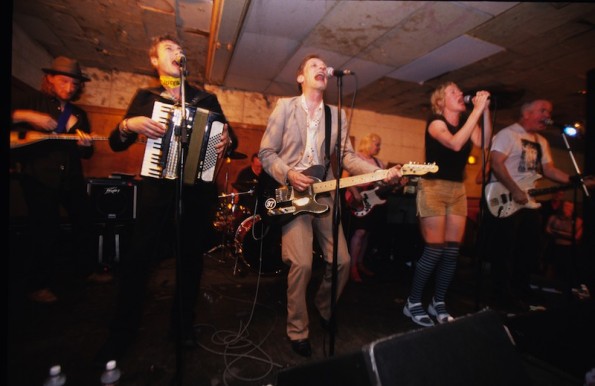Revenge of the Mekons (Angio, 2013)
To understand my reasons for wanting to review Revenge of the Mekons, there are some things about me that readers should know: I am and have been a musician since I could read. I play in several bands as a side-man, and I also write and sing lead for my own band. Music is my career, so when I saw the chance to review Revenge of the Mekons, I jumped at it.
The problem is…The Mekons are bad. Like, really. honestly bad. They’ll be the first to tell you. That’s their shtick. And it bothers me.
The documentary did a fine job showing us the story of the Mekons, starting in Leeds in 1977. Some students in the Art Department (only one of whom actually played an instrument) decided they wanted to be a band and so they were. Somehow, a couple of gigs later, they got a record deal, and the band evolved from there.
The Mekons just decided to be a band and they were. No one took lessons, or worked hard to be good at their instruments: they just jumped up on stage and started playing. Before you say that I sound like a crotchety old man yelling at kids to get off my lawn, I should explain that this is actually not one of the things that bothered me the most about their story.
The Mekons were part of a movement that I do actually respect: Punk. There’s an element to musical performance that makes the performer sort of transcend humanity and ascend into mild godhood. We see this in the huge megastars like Taylor Swift, or Ariana Grande, or Beyonce. They sort of leave the audience behind in the spectacle. Punk destroyed all that. Punk was about humans playing for humans, getting sweaty and making loud noises together. You didn’t have to be good, you just had to connect with people. That idea is honestly beautiful to me.
My problem is, it didn’t stop. Punk created a gulf between the untouchable gods of music and the thrown-together garage bands whose only fans were their friends who were also in punk bands. Artists trying to be great get shunned by the punk fans who want the thrown-together sweat and resent their success, but those sweaty bands usually can’t get too far because…well…they’re not very good.
So there is this vicious cycle, and the bands of that genre and era that remain popular were the ones who really inspired the genre in the first place. The Sex Pistols and The Clash were cited in the documentary as having influenced the Mekons to form in the first place mainly because the members of the Mekons realized they could perform without knowing how to play.
Punk inspired many bands with no musical discipline or vision for success to form. The Mekons were of this ilk, but they got lucky. They were given a record deal at one of their first shows. WHY? Because they had something: they didn’t know what it was or how to do it but their energy and ability to connect with the sweaty crowds was appealing to the record company. The Mekons toured and played extensively. While they weren’t great musicians, no one can deny the fact that the band did work extremely hard.
Much of the band’s history from this point on is interesting, but it is also sort of depressing. They lost some members, gained several more, and eventually hit the United States where they changed musical directions to incorporate folk into their sound. It changed, evolved and more records were made…but they still weren’t good.
The documentary shows several clips of them performing live. Today the band consists of several members, male and female playing a variety of different instruments, playing loudly (with some wrong notes) singing loudly (sometimes on key), drinking and dancing and having a swell time. They constantly make fun of themselves and each other. It’s a sort of family of friends, and the audience is invited to join in.

Describing the Mekons in this way actually makes them sound kind of sweet. And they are. But they’re not good. Which leads me to my gripe: the Mekons were a force of nature, somewhat popular back in the day, a band that has worked consistently and very hard but never got any success. This band has been working since 1977 and never broke through, possibly because they refused to give up their identity. They never ran their band as a business. They held onto their ideals and the vibe of the music rather than trying to market themselves or adapt to anything other than what they felt like doing.
I am wrestling with this. I mean, there’s really no reason for the Mekons to be successful: they were not revolutionary, nor super popular, nor original, nor even that good. But that amount of dedication and work should count for something! Right? As musicians, are they really content to have existed for 30 years playing to the same small number of people, selling the same small number of records?
As a musician myself, the film made me wonder about the purity of my work. Does the endless marketing, self-promotion, and attempts to gain fans actually get in the way of my music and ideals? If so what would happen if I held to some sort of musical ideal and stopped worrying about anything other than having fun and making music? What performing artist hasn’t asked the question, “What would happen if I stopped caring about commercial success and just did what I loved doing?”
If the Mekons is the answer…I’ll stick with the marketing.
—
Revenge of the Mekons will be available on DVD and VOD beginning July 28, 2015

